- Home
- Nicholas Sparks
The Return Page 3
The Return Read online
Page 3
I’d be lying if I said I didn’t miss surgery, though. I missed the raw way my hands felt after scrubbing, and the sound of the gloves snapping in place; I loved repairing bones and ligaments and tendons and feeling like I always knew exactly what I was doing. There was a kid in Kandahar about twelve years old who’d shattered his kneecap falling off a roof a couple of years earlier, and the local physicians had botched the operation so badly that he could barely walk. I had to rebuild the knee from scratch and six months later, when he returned for a checkup, he jogged toward me. I liked the way it made me feel—that I’d fixed him, allowing him to lead a normal life—and wondered whether psychiatry would ever give me that same satisfaction.
Because who is ever really fixed when it comes to mental or emotional health? Life takes radical twists and turns, and hopes and dreams shift as people enter different phases of their lives. Yesterday, via Skype—we speak every Monday—Dr. Bowen reminded me that we’re all continual works in progress.
I was musing about all of this as I stood over my grill later in the evening with the radio playing in the background. The sun was going down, illuminating a kaleidoscope sky as I flipped the NY strip I’d picked up from the Village Butcher on the far side of town. In the kitchen, I had a salad and baked potato ready to go, but if you’re thinking I’m some kind of chef, I’m not. I have a simple palate and I’m decent with the grill, but that’s about it. Since moving to New Bern, I’d been shoving charcoal into my grandfather’s old Weber three or four times a week and setting the coals ablaze. It made me nostalgic for all those summers of my childhood, when my grandfather and I grilled our suppers almost every night.
When the steak was ready, I added it to my plate and sat at the table on the back porch. It was dark by then, the house lights glowing from within, and moonlight reflected off the still waters of Brices Creek. The steak was perfect, but my baked potato was a bit cold. I would have popped it in the microwave, except for the fact that the kitchen didn’t have a microwave. Though I’d made the house livable, I hadn’t yet decided on whether to renovate the kitchen, or put on a new roof, or seal the windows, or even fix the slant in the kitchen floor. If I decided to sell the place, I suspected that whoever bought it would tear down the old house, so they could put a custom home on the property. You didn’t need to be a real estate whiz to figure out that any value to the property was in the land, not the structure.
After finishing my dinner, I brought the plate inside and set it in the sink. Opening a beer, I returned to the porch to do some reading. I had a stack of psychiatric books and textbooks I wanted to finish perusing before I moved to Baltimore, on subjects ranging from psychopharmaceuticals to the value and drawbacks associated with hypnosis. The more I’d been reading, the more I felt I had to learn. I had to admit my study skills were rusty; I sometimes felt like I was an old dog and these were new tricks. When I’d said as much to Dr. Bowen, he’d essentially told me to quit whining. Or that’s how I took it, anyway.
I’d settled into the rocking chair, turned on the lamp, and had just started reading when I thought I heard a voice calling out from around the corner of the house. I turned down the radio, waited a beat, and heard the sound again.
“Hello?”
Rising from my seat, I grabbed my beer and moved to the porch railing. Peeking into the darkness, I called back. “Is someone there?”
A moment later, a woman in uniform stepped into the light. Specifically, the uniform of a deputy sheriff. The sight caught me off guard. My experience with law enforcement to that point in my life was limited to highway patrolmen, two of whom had pulled me over for speeding in my younger years. Though I’d been apologetic and polite, each of them nonetheless gave me a ticket, and dealing with law enforcement ever since made me nervous. Even if I hadn’t done anything wrong.
I didn’t say anything; I was too busy trying to figure out why a deputy sheriff was paying me a visit, while the other part of my brain was processing the fact that the uniformed officer was female. Call me a sexist, but I hadn’t interacted with many women in law enforcement, especially down here.
“I’m sorry for coming around the side of the house,” she finally said. “I knocked, but I guess you didn’t hear me.” Her demeanor was friendly but professional. “I’m with the sheriff’s department.”
“Can I help you?”
Her eyes flickered to the grill, then back to me. “I hope I’m not interrupting your dinner.”
“Not at all.” I shook my head. “I just finished.”
“Oh, good. And again, I apologize for intruding, Mr.…”
“Benson,” I said. “Trevor Benson.”
“I just came by to ask whether you’re a legal resident of this property.”
I nodded, though I was a little surprised by the phrasing. “I guess so. It used to be my grandfather’s, but he passed away and left it to me.”
“You mean Carl?”
“You knew him?”
“A little. And I’m sorry for your loss. He was a good man.”
“Yes, he was. I’m sorry, but I didn’t catch your name.”
“Masterson,” she said. “Natalie Masterson.” She was quiet then, and I had a sense that she was studying me. “You said Carl was your grandfather?”
“On my mother’s side.”
“I think he mentioned you. You’re a surgeon, right? With the Navy?”
“I was, but not anymore.” I hesitated. “I’m sorry—I’m still not exactly sure why you’ve come by.”
“Oh.” She motioned toward the house. “I was finishing up my shift but I was out this way, and when I saw the lights on, I thought I’d check it out.”
“Am I not allowed to turn on lights?”
“No, it’s not that.” She smiled. “Obviously, everything is okay and I shouldn’t have bothered you. It’s just that a few months ago, after your grandfather had died, there were reports of lights in the windows. I knew the house was supposed to be empty, so I swung by to check it out. And though I couldn’t be certain, I had the impression that someone had been staying here. Not that there was any damage except for the back door, but combined with the lights being seen in the windows, I felt that I should keep an eye on the place. So I’ve made it a point to swing by every now and then, just to make sure there’s no one here that shouldn’t be. Vagrants or squatters, teens using the place to party, tweakers working a meth lab. Whatever.”
“Is there a lot of that around here?”
“No more than other places, I guess. But enough to keep us busy.”
“Just so you know, I don’t do drugs.”
She motioned toward the bottle I was holding. “Alcohol is a drug.”
“Even beer?”
When she smiled, I guessed she was a few years younger than me, with blond hair tacked up into a messy bun, and her eyes were so aqua colored that they could have been bottled and sold as mouthwash. That she was attractive went without saying, and better yet, she wasn’t wearing a wedding ring.
“No comment,” she finally offered.
“Would you like to come in and check out the house?”
“No, that’s all right. I’m just glad I don’t have to worry anymore. I was fond of Carl. Whenever he was selling honey at the farmers’ market, we’d visit for a while.”
I remembered sitting with my grandfather at a roadside stand every Saturday during my visits, but I had no recollection of a farmers’ market. Then again, New Bern had a lot more of everything now than it had in the past—restaurants, stores, businesses—even if it still remained a small town at heart. Alexandria, which was just a suburb in the DC area and one of many, had five or six times the population. Even there, I suspect Natalie Masterson would have turned heads.
“What can you tell me about the possible squatter?” I asked.
I didn’t really care about the squatter, but somehow I was reluctant to see her go.
“Not much more than I already told you,” she said.
“Do you
think you might come up here?” I pleaded, pointing to my ear. “So I can hear you better? I was caught up in a mortar attack in Afghanistan.”
I could hear her fine, by the way; the inner workings of my ear weren’t damaged in the blast, even if the outer part had been torn from my head. It’s just that I’m not above playing the sympathy card when I need to. I retreated to my rocker, hoping she hadn’t wondered why I seemed to be able to hear her without trouble only moments before. In the porch light, I saw her eyeing my scar before she finally started up the steps. When she reached the other rocker, she angled it toward me, while also sliding it back.
“I appreciate this,” I said.
She smiled, not overly warm, but enough for me to realize she did indeed have suspicions about my hearing and was still debating whether to stay. It was also a wide enough smile to notice her white and perfectly straight teeth.
“As I was saying…”
“Are you comfortable?” I asked. “Can I offer you something to drink?”
“I’m fine, thank you. I’m on duty, Mr. Benson.”
“Call me Trevor. And please—start at the beginning.”
She sighed, and I could have sworn I saw the trace of an eye roll.
“There was a series of electrical storms last November, after Carl passed away. A lot of lightning, and at the trailer park down the road, one of the trailers caught fire. The fire department responded, so did I, and not long after the fire was out, one of the guys mentioned that he likes to go hunting on the far side of the creek. It was just small talk, you know?”
I nodded, remembering the burned-out husk I’d noticed my first week here.
“Anyway, I happened to bump into him a couple of weeks later, and he mentioned that he’d noticed lights in your grandfather’s house, not just once, but two or three times. Like a candle being carried past the windows. He was kind of far away and I wondered if it had been his imagination, but since it kept happening and he knew that Carl had died, he thought he should mention it.”
“When would this have been?”
“Last December, maybe midmonth? There was a week or two there when it was really cold, so it wouldn’t have surprised me if someone broke in just to stay warm. The next time I was in the area I stopped by and saw that the back door was broken and the knob had almost fallen off. I went inside and did a quick search, but the place was empty. Aside from the broken door, I didn’t find evidence that anyone had been inside. There was no trash, and the beds were made; as far as I could tell, nothing appeared to be missing. But…”
She paused, frowning at the recollection. I took a sip of beer, waiting for her to go on.
“There were a pair of used candles on the counter with blackened wicks, and a half-empty box of candles as well. I also noticed that some of the dust had been wiped away at the kitchen table, like someone had eaten there. It also seemed like someone had been using one of the recliners in the family room because there was cleared space on the neighboring side table and it was the only piece of furniture in the living room that wasn’t dusty. It wasn’t anything I could prove, but just in case, I found some extra boards in the barn and sealed the back door.”
“Thanks for that,” I said.
Though she nodded, I could tell something about those memories was still bothering her. She went on. “Did you happen to notice whether anything was missing when you moved in?”
I thought about it before shaking my head. “Not that I could tell. Except for the funeral in October, I hadn’t been down here in a few years. And that week is a bit hazy in my memory.”
“Was the back door intact then?”
“I went in through the front, but I’m sure I checked all the locks when I left. I think I would have noticed if the back door was damaged. I know I spent time on the back porch.”
“When did you move in?”
“End of February.”
She digested that, her eyes flashing to the back door.
“You believe someone did break in, don’t you?” I finally asked.
“I don’t know,” she admitted. “Usually, when something like that occurs, things are broken and there’s trash strewn about. Bottles, food wrappers, detritus. And vagrants don’t usually make the bed before they leave.” She thrummed her fingers on the rocker. “Are you sure nothing was missing? Guns? Electronics? Did your grandfather keep cash around?”
“My grandfather didn’t have much in the way of electronics or cash, as far as I know. And his gun was in the closet when I moved in. It’s still there, by the way. It’s a small shotgun to keep the varmints away.”
“That makes it even stranger because usually, guns are the first things stolen.”
“What do you make of it?”
“I don’t know,” she said. “Either no one was there or you were visited by the tidiest and most honest vagrant in history.”
“Should I be worried?”
“Have you seen or heard anyone creeping around the property since you’ve moved in?”
“No. And I’m frequently awake during the night.”
“Insomnia?”
“Some. But it’s getting better.”
“Good,” she said, adding nothing more. She smoothed the pants of her uniform. “But I’ve taken enough of your time. That’s all I can really tell you.”
“I appreciate you swinging by and telling me about all this. And for fixing the door.”
“It wasn’t much of a fix.”
“It did the job,” I said. “It was still boarded up when I got here. How much longer is your shift?”
She glanced at her watch. “Actually, believe it or not, it’s over now.”
“Then are you sure I can’t get you a drink?”
“I don’t think that would be a good idea. I still have to drive home.”
“Fair enough,” I said, “but before you go—and since you’re off, and I’m new in town—tell me what I need to know about New Bern these days. I haven’t been here in a while.”
She paused, arching an eyebrow. “Why would I do that?”
“Aren’t you supposed to protect and serve? Think of this as the serve part. Like fixing my door.” I tried out my most winning smile.
“I don’t think that being a welcoming committee is part of my job description,” she deadpanned.
Maybe not, I thought, but you haven’t left yet.
“All right,” I said. “Tell me what made you want to become a sheriff.”
With my question, she looked at me. Maybe, truly, for the first time, and again I found myself transfixed by the color of her eyes. They were like the waters of the Caribbean in an upscale travel magazine.
“I’m not the sheriff. That’s an elected position. I’m a deputy.”
“Are you avoiding my question?”
“I’m wondering why you want to know.”
“I’m a curious person. And since you helped me out, I feel like I should know at least a little about the person who did the helping.”
“Why do I get the impression you have an ulterior motive?”
Because you’re not only pretty, you’re obviously smart as well, I thought. I shrugged, feigning innocence.
She studied me before finally responding. “Why don’t you tell me about yourself first.”
“Fair enough. Ask away.”
“I’m guessing that the mortar round is the reason you’re no longer in the Navy or a doctor?”
“Yes,” I said. “I was hit by a mortar just as I was leaving the hospital where I worked. Lucky shot. Or, for me, unlucky. Fairly serious injuries. In the end, the Navy put me on disability and let me go.”
“Tough break.”
“It was,” I admitted.
“And you’re in New Bern because…?”
“It’s only a temporary stay,” I said. “I’m moving to Baltimore this summer. I’m starting a new residency in psychiatry.”
“Really?” she asked.
“Is there something wrong with psychiatry?”
/>
“Not at all. It’s just not what I expected you to say.”
“I can be a good listener.”
“It’s not that,” she said. “I’m sure you are. But why psychiatry?”
“I want to work with veterans with PTSD,” I said. “I think there’s a need for it these days, especially with soldiers and marines doing four or five rotations. As I mentioned, it can stay with a person after they’re back.”
She seemed to be attempting to read me. “Is that what happened with you?”
“Yes.”
She hesitated and I had the sense she continued to really see me. “Was it bad?”
“No question,” I said. “Terrible. And it still is, every now and then. But that’s probably a story for another time.”
“Fair enough,” she offered. “But now that I know, I’ll admit that I was wrong. It sounds like it’s exactly what you should do. How long is a psychiatric residency?”
“Five years.”
“I’ve heard residencies are hard.”
“It’s no worse than being dragged by a car down the highway.”
For the first time, she laughed. “I’m sure you’ll do fine. But I do hope you find some time to enjoy our town while you’re here. It’s a beautiful place to live, and there are a lot of good people here.”
“Did you grow up in New Bern?”
“No,” she answered. “I grew up in a small town.”
“That’s funny.”
“But true,” she said. “Can I ask what you intend to do with the place? When you leave?”
“Why? Are you interested in buying?”
“No,” she said. “And I doubt I could afford it.” She brushed a strand of hair from her eyes. “Where are you from, by the way? Give me a quick sketch of who you are.”
Pleased that she was interested, I gave her a brief history: my youth in Alexandria, my parents, my regular summertime visits to New Bern when I was younger. High school, college, medical school and residency. My time with the Navy. All with a touch of the modest hyperbole men use when trying to impress an attractive woman. As she listened, her eyebrows twitched more than once, but I couldn’t tell whether she was fascinated or amused.

 The Notebook
The Notebook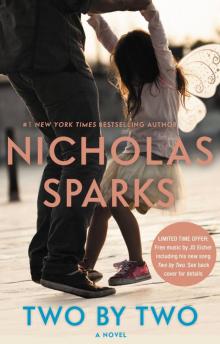 Two by Two
Two by Two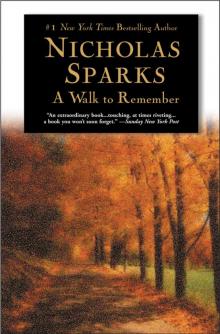 A Walk to Remember
A Walk to Remember The Guardian
The Guardian Dear John
Dear John The Last Song
The Last Song The Lucky One
The Lucky One The Wedding
The Wedding The Longest Ride
The Longest Ride Safe Haven
Safe Haven The Rescue
The Rescue The Wish
The Wish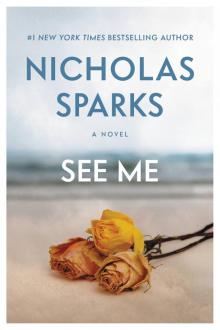 See Me
See Me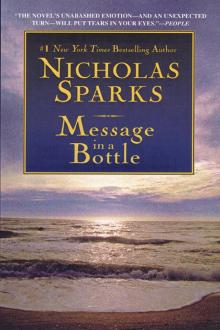 Message in a Bottle
Message in a Bottle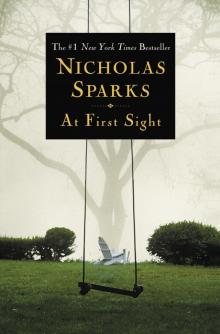 At First Sight
At First Sight True Believer
True Believer The Return
The Return A Bend in the Road
A Bend in the Road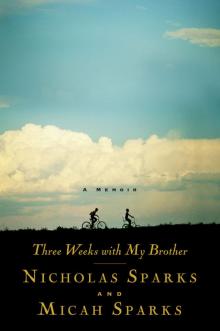 Three Weeks With My Brother
Three Weeks With My Brother Nights in Rodanthe
Nights in Rodanthe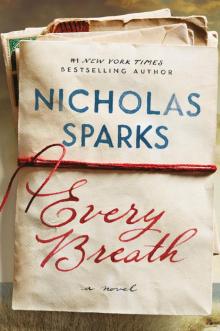 Every Breath
Every Breath